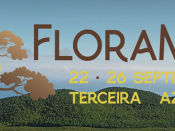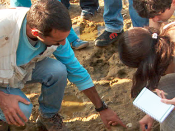Por Luísa Romão (BioISI /INSA).
The nonsense-mediated mRNA decay (NMD) pathway selectively degrades mRNAs carrying a premature translation-termination codon but also regulates the abundance of a large number of physiological RNAs that encode full-length proteins. In human cells, NMD-targeted mRNAs are degraded by endonucleolytic cleavage and exonucleolytic degradation from both 5’ and 3’ ends. This is done by a process not yet completely understood that recruits decapping and 5’-to-3’ exonuclease activities, as well as deadenylating and 3’-to-5’ exonuclease activities. In our lab, we have been unveiling the role of the 3’-to-5’ exoribonuclease DIS3L2 in NMD. We have observed that some specific NMD-targets are in fact direct DIS3L2 substrates. In addition, we now know that DIS3L2 acts over full-length transcripts, through a process that also involves the UPF1 NMD player, and depends on the activity of the terminal uridylyl transferases (TUTases) Zcchc6/11 (TUT7/4). We are now testing which NMD-inducing features contribute to DIS3L2 target specificity.
Most of the literature that concerns DIS3L2 characterizes its involvement in several RNA degradation pathways, however, there is some evidence that its dysregulated activity may contribute to cancer development. We characterized the role of DIS3L2 in human colorectal cancer (CRC). Using the public RNA datasets from The Cancer Genome Atlas, we found higher DIS3L2 mRNA levels in CRC tissues than in normal colonic samples. In addition, our RNA deep-sequencing data revealed that DIS3L2 depletion induces a strong transcriptomic disturbance in SW480 CRC cells. Moreover, gene ontology analysis of significant upregulated transcripts displays enrichment in mRNAs encoding proteins involved in cell cycle regulation and cancer-related pathways. This guided us to evaluate which specific hallmarks of cancer are differentially regulated by DIS3L2. To do so, we employed four CRC cell lines (HCT116, SW480, Caco-2 and HT-29) differing in their mutational background and oncogenicity. We observed that depletion of DIS3L2 reduces the viability of highly oncogenic SW480 and HCT116 CRC cells. We also found that the mTOR signaling pathway, crucial for cell viability and survival, is suppressed upon DIS3L2 depletion in those cell lines. Moreover, loss of DIS3L2 expression impairs SW480 and HCT116 cell migration and invasion. Interestingly, interference with DIS3L2 expression does not significantly affect any of these properties in the low oncogenic Caco-2 and HT-29 CRC cell lines, nor in control NCM460 non-transformed colonocytes. Collectively, these results contribute to improve our understanding of DIS3L2 function in key hallmarks of cancer and suggest a pro-tumorigenic role for this ribonuclease in advanced CRCs.























